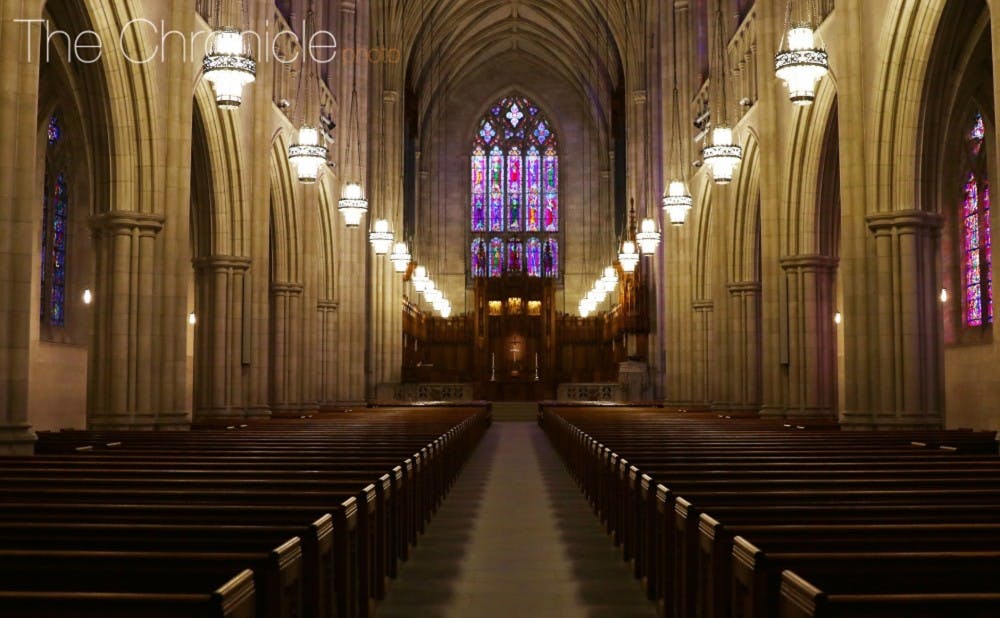From the pew bench to family couches, Duke Chapel members continue to take part in religious services—just from the comforts of their homes.
Since Wednesday, March 11, Duke Chapel has been closed to the public due to the COVID-19 outbreak, with all in-person services and other events canceled until further notice.
Chapel administrators and churchgoers told The Chronicle that congregation members are viewing service livestreams and videos. Many Chapel groups are also continuing to meet virtually—and they are optimistic that the congregational community will ultimately be strengthened by this situation.
Bruce Puckett, the assistant dean of Duke Chapel, said that delivering sermons to an empty chapel feels “strangely normal.”
“It doesn’t take a lot of imagination to recognize that a lot of people are paying attention to this and watching this,” Puckett said. "That’s been part of it for me, is recognizing that this is a gift to the whole community and not just for the people in this room.”
According to Puckett, the in-person services usually have 450 to 550 people in attendance. However, he said that numbers began to decline on Sunday, March 8 as news of COVID-19 cases in the United States began to draw attention.
This came along with an increase in online viewership for the Chapel’s services. Services posted to YouTube on Sunday, March 15 and Sunday, March 22 both got over 2,000 views. Before the Chapel’s closure due to COVID-19, most online services got no more than 1,000 views.
Puckett noted that Chapel staff are still legally permitted to go into the Chapel to film services, despite Durham’s recently-issued stay-at-home order.
Services are now being filmed in the smaller Memorial Chapel, rather than in the main part of the Chapel, Puckett noted. There are only five people present: four ministers and an organist. Additionally, the services last 35 to 40 minutes rather than the usual one hour and five minutes, and the services’ format has been simplified.
The Chapel staff and congregants The Chronicle spoke to expressed their belief that the Chapel community would ultimately be strengthened by this time of separation.
“Without a doubt, nobody will take for granted any of the social interactions that we get to have at least initially, when all of this is past,” Puckett said. “We’ll recognize how important a touch is, and how thankful we are to be able to shake someone’s hand.”
Congregation members reiterated the thought that the Chapel’s closure to the public serves as a reminder to value the Chapel and its community. Stacy Nelson, a pharmaceutical consultant, has been a member of the Duke Chapel congregation for 12 years and attended every Sunday service when she was in town.
“I am reminded that it is easy to take for granted being able to worship in Duke Chapel, and I anticipate there will be a joyous celebration and feelings of gratitude when we can worship together in Duke Chapel again,” Nelson wrote in an email.
One of the biggest differences in the online services, Puckett said, is that there is less music than in regular services because the choir cannot perform. Instead, an organist plays at the beginning of the service, and the ministers sing a song toward the end.
One reason the Chapel staff decided to shorten and simplify filmed services is to acknowledge that these are not normal times, Puckett explained.
“Even by simplifying our service, one of the things we’re trying to communicate is, ‘we recognize that the world is not the same right now for you, so we’re not going to try to pretend like the world is the same for us.’ So we’re not just having our service as usual, we’re doing something different, because life is different right now,” he said.
According to the Rev. Kathryn Lester-Bacon, the Chapel’s director of religious life, all 23 officially recognized religious groups on campus have continued to connect in some way. She said that many have continued weekly Bible studies or prayer groups, and leaders of some organizations have prioritized one-on-one calls to check in with members.
Member responses to closure
Despite the Chapel community’s inability to gather physically, members of the congregation wrote in emails to The Chronicle that they thought the cancellation of services was appropriate, and online services are a much-appreciated alternative.
Nelson wrote that she was “not surprised at the cancelation and felt that it was the appropriate action to take in the interest of the health and wellbeing of our larger community.”
Get The Chronicle straight to your inbox
Sign up for our weekly newsletter. Cancel at any time.
While she was “sad at the thoughts of not being in that awe-inspiring space for an unknown period of time,” Nelson has watched service livestreams and videos before, and she appreciates their comforting familiarity.
Chapel Choir member Jim Kelly, School of Medicine ‘70 and Fuqua ‘97, wrote in an email that he and his wife have watched both livestreamed services since Duke Chapel’s closure to the public.
“The online services fill the need for hearing the Word and the Prayer prayed, preached and read by Chapel Ministers. The ‘fellowship of believers,’ however, is absent in the literal sense. I especially miss the choir,” Kelly wrote.
Kelly noted that the Chapel Choir is still holding virtual choir rehearsals over Zoom.
Chapel services also now include messages to the congregation about the current pandemic and related hardships, Puckett explained.
“Our services are thinking about current events every time we make them. Whether it’s in our prayers, or our preaching, or the announcements we give, we are always responding to what’s happening in the world,” he said.
Congregation members are particularly disappointed to miss Holy Week and Easter Sunday in the Chapel, pastor of the congregation Carol Gregg wrote in an email. Puckett said that the Chapel typically has three services on Easter, with around 1,000 people attending each service.
Chapel staff are planning something different for Easter Sunday this year, Puckett said. He explained that the service will be filmed in the main part of the Chapel, instead of in the Memorial Chapel, and the service will likely include more music.
Gregg and Puckett both explained that Chapel pastors and staff are encouraging congregants to call community members on the phone to check in on each other. Gregg wrote that many of the oldest congregants have already been contacted by members of the Chapel community to ensure they have everything they need and do not feel overly isolated.
All services can now be livestreamed every Sunday and are also available on YouTube to be watched at any time.

Anna Zolotor is a Trinity senior and recruitment chair for The Chronicle's 118th volume. She was previously news editor for Volume 117.

